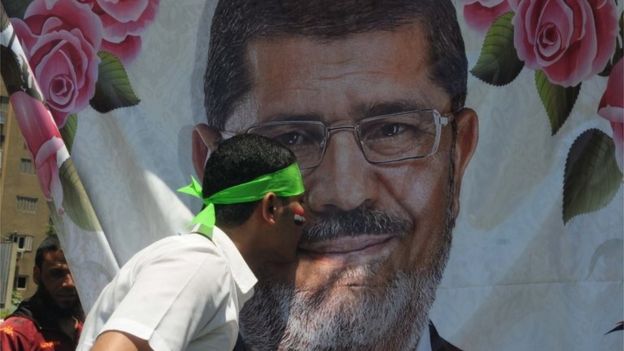
Egypt’s former President Mohammed Morsi, ousted by the military in 2013 after one year in office, has collapsed in a courtroom and died, officials say.
A top figure in the now-banned Islamist movement Muslim Brotherhood, Morsi had just addressed the court from a cage at a hearing on charges of espionage.
Morsi, who was 67, had been in custody since his removal after mass protests.
The Muslim Brotherhood said the death was a “full-fledged murder” and called for crowds to gather at the funeral.
Activists and his family had long complained about his prison conditions, saying Morsi was not receiving treatment for serious health problems such as high blood pressure and diabetes, and was constantly being held under solitary confinement.
Morsi collapsed moments after addressing the court in Cairo at a hearing related to charges of espionage emanating from suspected contacts with the Palestinian Islamist group Hamas, which had close ties to the Muslim Brotherhood.
He spoke for five minutes from a soundproof glass cage which officials said was designed to prevent him disrupting proceedings. The cause of death was not immediately confirmed but Egypt’s public prosecutor said an initial report showed no signs of recent injuries on the body.
Last month, his family said authorities had repeatedly denied access to him and that they knew little about his health conditions, a situation that “violate[d] constitutions applied all over the world”.
In March last year, his youngest son, Abdullah, said officials were “doing this on purpose, since they want to see him dead ‘from natural causes’ as soon as possible”.
Mohammed Morsi An Obituary
Morsi, who became Egypt’s first democratically elected leader after winning polls in 2012, had already been sentenced to more than 45 years in prison in three separate trials, including leading an outlawed group, detention and torture of anti-government protesters and leaking state secrets.
He had always rejected the authority of the courts, and his supporters denounced the trials as politically motivated and attempts to give legal cover to a coup based on unreliable witnesses and scant evidence.
Mohammed Morsi was Egypt’s first democratically elected president, but lasted only one year in power before being ousted by the military on 3 July 2013.
The military’s move followed days of mass anti-government protests and Morsi’s rejection of an ultimatum from the generals to resolve Egypt’s worst political crisis since Hosni Mubarak was deposed in 2011.
Four months after he was toppled, Morsi went on trial alongside 14 senior figures from the Islamist Muslim Brotherhood movement, accused of inciting his supporters to murder a journalist and two opposition protesters, and ordering the torture and unlawful detention of others.
The charges related to clashes between opposition protesters and Muslim Brotherhood supporters outside the Ittihadiya presidential palace in Cairo in December 2012.
At the first hearing, he shouted from the dock that he was the victim of a “military coup” and rejected the authority of the courts to try him.
He was acquitted of murder but jailed for 20 years for ordering the torture and detention of protesters. Morsi subsequently faced a raft of other charges, and was sentenced to death, although the conviction was overturned.
He was on trial for espionage when he died in court on 17 June 2019.
Islamist MP
Mohammed Morsi was born in the village of El-Adwah in the Nile Delta province of Sharqiya in 1951.
He studied Engineering at Cairo University in the 1970s before moving to the United States to complete a PhD.
After returning to Egypt he became head of the engineering department at Zagazig University.

He rose through the ranks of the Muslim Brotherhood and served as an independent in the movement’s parliamentary bloc from 2000 to 2005.
As an MP, he was occasionally praised for his oratorical performances, for example after a rail disaster in 2002 when he denounced official incompetence.
Morsi was chosen as the Muslim Brotherhood’s presidential candidate in April 2012 after the movement’s deputy general guide, millionaire businessman Khairat al-Shater, was forced to pull out.
In his election campaign, Morsi presented himself as a bulwark against any revival of the old guard of Hosni Mubarak.
Mass protests
When he came to power in June 2012 after a narrow election victory, Morsi promised to head a government “for all Egyptians”.
But critics complained he had failed to deliver during his turbulent year in office. They accused him of allowing Islamists to monopolise the political scene, concentrating power in the hands of the Muslim Brotherhood.
Moreover, they said he had mishandled the economy and failed to deal with the very issues that led to the uprising that brought him to power: calls for rights and social justice.





Be the first to comment